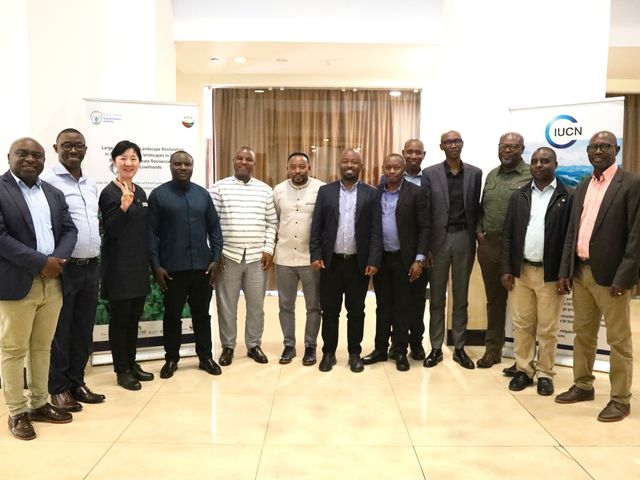March 28th, 2025 – Kigali, Rwanda – A significant milestone in Rwanda’s Forest Landscape Restoration (FLR) journey was reached in Kirehe and Nyagatare Districts.
This was highlighted by Dr. Concorde Nsengumuremyi, Director General of the Rwanda Forestry Authority (RFA), during the Alliance for Restoration of Forest Landscapes and Ecosystems in Africa (AREECA) Steering Committee (PSC) meeting held in Kigali on March 26th, 2025.
The PSC meeting was chaired by Dr. Concorde Nsengumuremyi and Ms Kaori Yasuda, IUCN Rwanda Country Representative.
The meeting brought together members of PSC from Government Institutions including Ministry of Local Government, Ministry of Agriculture and Animal Resources, District representatives and Implementing partners among others.
The meeting provided an opportunity for key stakeholders to review the project's progress and discuss its sustainability as it approaches its final year. While various stakeholders from national and international organizations have contributed to the project’s success, the Rwanda Rural Rehabilitation Initiative (RWARRI) stands out for its instrumental role in engaging local communities and spearheading grassroots mobilization in Nyagatare and Kirehe districts.
“One of the success stories of the AREECA project in Rwanda is community mobilization, which RWARRI led and successfully implemented,” said Joseph Njue, IUCN AREECA Regional Project Manager, during the PSC meeting.
The AREECA project, launched in 2021, is part of Rwanda’s commitment under the Bonn Challenge to restore 2 million hectares of degraded land by 2030. Focused on Eastern Rwanda, the project targets Kirehe and Nyagatare districts, both of which have been highly vulnerable to the impacts of climate change. Through the restoration of degraded land by planting agroforestry trees, reforestation, fruit trees, indigenous trees and improved cool stoves distribution, the project aims to increase biodiversity, enhance resilience to climate change, and improve the livelihoods of local communities. This is achieved not only through direct tree-based restoration but also by strengthening key enablers of forest landscape restoration through a community-centric approach, where communities lead all implementation activities on the ground without the involvement of service providers.
RWARRI’s role in the AREECA project has been pivotal in ensuring that the local population in Nyagatare and Kirehe plays an active role in the restoration process. The organization’s strength lies in its ability to engage with communities, raise awareness about the importance of land restoration, and create a sense of shared ownership over the project’s goals. By working closely with local farmers, women, youth, and pastoralists, RWARRI helped highlight the importance of sustainable land management practices, providing the community with the knowledge and tools necessary to improve the productivity and ecological health of their land across several sectors in Kirehe and Nyagatare districts.
One such farmer, Nyiransabimana Alice from Nyagatare, shared her experience, saying, “Now it will be easier to prepare food after getting improved cook stoves.” This reflects the tangible benefits the community is already experiencing as a result of their participation in the AREECA project. In fact, improved cook stoves are essential for households as they enhance health by reducing smoke-related diseases and improve energy efficiency. Cook stoves help to conserve the environment by reducing deforestation and carbon emissions, while also saving time and increasing safety by minimizing fire hazards. Additionally, they allow families to focus on other productive activities, improving overall quality of life.
Another farmer, Uwayezu Jean from Rwimiyaga in Kirehe, explained how RWARRI supported him: “RWARRI has been with us every step of the way, teaching us how to manage our land more effectively with trees from AREECA.” Thanks to them, we now know how to combine trees with crops. “I am seeing a clear improvement in my lands, especially in issues related to erosion control and combating desertification,” she added.
In addition, another farmer, Kayitesi Francine from Rwimiyaga sector in Nyagatare District, expressed her gratitude for RWARRI’s mobilization efforts: “Before RWARRI came to us, we didn’t know how important agroforestry was. Many people and cows used to destroy trees on our farms. However, we are now planting trees alongside our crops, and our land is healthier. They made us realize that we need to take care of our land to secure our future.”
Beneficiaries of AREECA also appreciate the improved cook stoves they got the project.
Mukansanga Apollinarie, a resident of Kirehe, shared, "We used to go days without eating because of the lack of firewood." She went on to express her appreciation for the improved cooking stoves provided by the project, stating, “Truly, these improved cooking stoves have started greatly helping us; we previously did not have enough firewood, but we now have a solution; we have started saving money and time as a result of these improved cooking stoves.”
In the PSC meeting, the progress in these districts was highlighted as one of the most successful aspects of the AREECA project. Participants emphasized the importance of RWARRI’s community mobilization efforts, noting that the involvement of local communities in the restoration process has been critical in achieving the project’s objectives. The community-driven approach has not only contributed to the restoration of the lands but has also empowered local populations to take control of their environmental future.
As the project enters its final year, discussions at the PSC meeting focused on ensuring the sustainability of the restoration efforts and scaling up the best practices developed in Nyagatare and Kirehe. RWARRI’s role in building local capacity and fostering community ownership is seen as essential for ensuring that the gains made during the project’s implementation continue long after it ends. There is a strong consensus among stakeholders that RWARRI’s approach should be replicated in other parts of Rwanda to ensure the long-term success of the country’s Forest Landscape Restoration (FLR) efforts.
By Jean Claude HABIMANA, a UR Student in Master’s program and Internee at RWARRI
